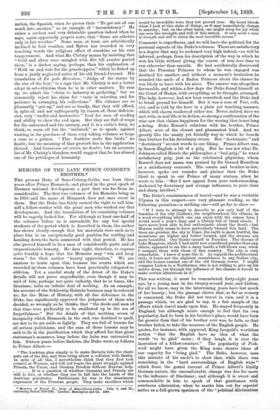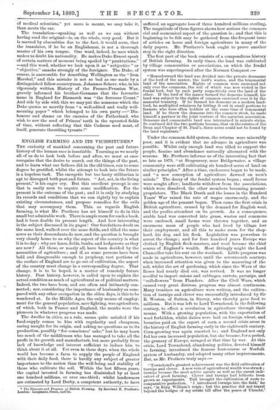MEMOIRS OF THE LATE PRINCE CONSORT'S BROTHER.* THE present Duke
of Saxe-Coburg-G-otha was born three years after Prince Bismarck, and played in the great epoch of German national development a part that was far from in- considerable. The first two volumes of his Memoirs bring us to 1850, and the name of Bismarck does not once occur in them. But the Duke has fairly earned the right to call him- self a fellow-worker with the great men who worked out that development. And the translation of his remaining volumes will be eagerly looked for. For although at least one-half of the volumes before us is unreadable for any but special students of the period which is described in them, the author has shown clearly enough that his materials were such as to place him in an exceptionally good position for settling and handing down the facts connected with that period. He has also proved himself to be a man of considerable parts and of unquestionable honesty. He does right, therefore, to express quite frankly a hope that his Memoirs may " win and keep warm" for their author "hearty appreciation." We are anxious to insist upon this, because the events which are recorded in these volumes have been practically relegated to oblivion. Yet a careful study of the driest of the Duke's details will not prove unprofitable, even though it may be said of him, perhaps not quite unfairly, that he at times, like Gratiano, talks an infinite deal of nothing. As an. example,
his account of the Schleswig-Holstein business may be referred to ; for the Muse of History, with all due deference to the Duke, has significantly approved the judgment of those who decided, so wrongly as he thinks, that "the deeds and men of that time were preferably to be swallowed up in the sea of forgetfulness." But the details of that seething ocean of incapacity which Bismarck, in the end, was destined to quell, are not to be set aside so lightly. They are full of lessons for
all serious politicians, and the sum of these lessons may be said to lie in the justification which they afford for that great statesman's measures, long before the helm was entrusted to him. Sixteen years before Sadowa, the Duke wrote as follows to Prince Albert :—
"The Austrian plan simply is to make Bavaria take the chest- nuts out of the fire, and thus bring about a collision with Berlin. In spite of all this, I nevertheless think that they first took counsel at Warsaw, and will not begin the giant struggle against Prussia, the Union, and German freedom without Russian help.
It is a question of whether Germany and Prussia are still to live, or whether they are to fall into the hands of the Austrian potentates. Enthusiasm for war is the unanimous expression of the Prussian people. They make sacrifices which
• Memoirs of Ernest II., Duke of Saree.Coburg-Gotha. Vols. I. and II., embracing Period 1818-1850. London : Remington and Co. 1888. would be incredible were they not proved true. My heart bleeds when I look at this state of things, as it may immediately change to anarchy; but, on the other hand, one might weep for joy when one sees the strength and will of this nation. It only needs a man of strength and will to obtain the most incredible success."
Comment is superfluous, and we will leave the political for the personal aspects of the Duke's volumes. These are satisfactory
to a degree that may be reckoned very high indeed,—as will be
inferred, perhaps, from his description of the way in which he won his bride without giving the course of true love time to ran otherwise than smooth. He had accidentally discovered that the Prussian. Princess to whom he was engaged was destined for another, and without a moment's hesitation he sounded the uncle of a Baden Princess about the chance he was likely to have with his niece. The answer was altogether favourable, and within a few days the Duke found himself at the Court of Baden, with everything, as he thought, arranged. The lady, however, had not been consulted, and the Duke had
to break ground for himself. But it was a case of Veni, vidi, vici, and is told by the hero in a plain yet touching manner, which will charm readers of either sex. Never, indeed, have we met with, in real life or in fiction, so strong a confirmation of the wise saw that claims happiness for the wooing that is not long
a-doing. Duke Ernest's relations with his brother, Prince Albert, were of the closest and pleasantest kind. And we greatly like the manly yet friendly way in which he beards that brother for his doctrinary errors. But " doctrinaire " and " doctrinary " are not words to our liking. Prince Albert was, in Saxon English, a bit of a prig. But he was not what Dr. Johnson called Harris the philosopher, a " bad prig ;" he was a satisfactory prig, just as the celebrated physician, whom Boswell does not name, was praised by Sir Gerard Hamilton as a satisfactory coxcomb. His cousin and brother-in-law, however, spoke out rounder and plainer than the Duke liked to speak to our Prince of many statues, yvhen he wrote to him : " But I now appeal from your understanding, darkened by doctrinary and strange influences, to your clear and sharp intellect."
The Duke's reminiscences of travel—and he was a veritable Ulysses in this respect—are very pleasant reading, as the
following quotation—a striking one—will go far to show:— "If I were to attempt to describe to you only half of the beauties of the city (Lisbon), the neighbourhood, the climate, in a word everything which one can enjoy with the senses here, I would need a year's time and a library full of blank sheets. I have never been able to feel enthusiastic about the South—but Heaven really seems to have particularly blessed this land. The trees are greener, the sky is bluer, the earth is more fruitful, the mountains are higher and better formed, and the streams are more beautiful. One thinks oneself in Paradise. The charms of Lake Maggiore, which I had until now considered greater than any others, appeared to me like a daisy beside a full-blown rose, when I compare them with those of this country. The city is very remarkable. I know of none like it. As regards the architectural style, it bears not the slightest resemblance to any Italian city, and the houses remind one of the old German towns. I might compare Lisbon to a Northerner, who is not willing to give up his native dress, yet through the influence of the climate is forced to make certain alterations in it."
This was written, it must be remembered, forty-eight years ago, by a young man in his twenty-second year, and Lisbon, for all we know, may in the intervening years have lost much of her beauty ; but the passage shows that, so far as scenery is concerned, the Duke did not travel in vain, and it is a passage which, we are glad to say, is a fair sample of the effects which travel made upon him. He stayed frequently in England, but although acute enough to feel that his own popularity, had he been in his brother's place, would have been far greater than that of his brother ever was, he fails, as that brother failed, to take the measure of the English people. He quotes, for instance, with approval, King Leopold's worthless notion " that the English have no idea of what the
words `to be glad' mean ; if they laugh, it is over the laceration of a fellow-creature." The popularity of Pick.. wick might have given the King some clearer ideas of our capacity for " being glad." The Duke, however, uses
this mistake of his uncle's to show that, while there was something in the "hard surroundings of English ways" which froze the genial current of Prince Albert's kindly German nature, the uncomfortable change was due far more to the influence of Stockmar ; and although it is sweet and commendable in him to speak of that gentleman with courteous admiration, when he marks him out for especial notice as a full-grown. specimen of the " political dilettantism of medical scientists," yet more is meant, we may take it, than meets the ear.
The translation—speaking as well as we can without having read the original—is, on the whole, very good. But it is marred by obscurities due to the fact, it would seem, that the translator, if he be an Englishman, is not a thorough master of his own tongue. One word, indeed, he uses which makes us diinlit his nationality. He makes Duke Ernest speak of certain matters of moment being spoiled by " punktations," —and this word, whether we look upon it as " subjective " or "objective," smacks strongly of the foreigner. The Duke, of course, is answerable for describing Wellington as the "Iron Marshal," and this mistake is not so bad as one made by a distinguished fellow-countryman, Johannes Soherr, who, in his vigorously written History of the Franco-Prussian War, gravely informed his brother-Germans that the favourite name in England for Bismarck was "the ferreous Count." And side by side with this we may put the nonsense which the Duke quotes so merrily from " a well-edited and really well- meaning paper" which belonged to his own party :—" Dis- honour and shame on the enemies of the Fatherland, who wish to sow the seed of Princes' teeth in the uprooted fields of time, without reflecting that this Cadmus seed must, of itself, generate throttling tyrants !"



































 Previous page
Previous page